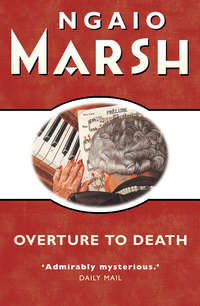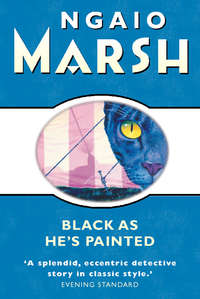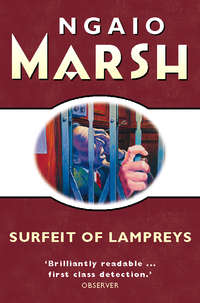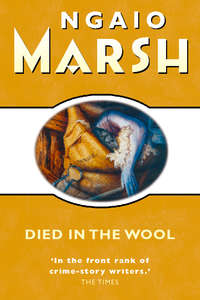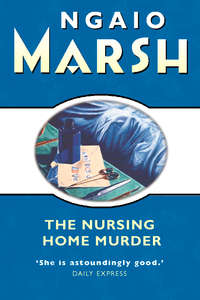
Полная версия
Black As He’s Painted
‘Lose the sun,’ Mr Whipplestone sneered, keeping his head, ‘Get none in the winter.’
It was, however, receiving its full quota now.
‘Damp,’ persisted Mr Whipplestone defiantly. ‘Extra expense. Have to be kept up.’ And he thought: ‘I’d do better to hold my tongue.’
The kitchen was on the left of the dining-room. It was a modernized affair with a service hatch. ‘Cramped!’ Mr Whipplestone thought of saying but his heart was not in it.
The stairs were steep which ought to have been a comfort. Awkward for trays and luggage and suppose one died how would they get one out of it? He said nothing.
The view from the master-bedroom through the french windows embraced in its middle distance the Square with the Sun in Splendour on the left and – more distantly on the right – the dome of the Basilica. In the foreground was the Walk with foreshortened views of pedestrians, parked cars and an intermittent passage of traffic. He opened a french window. They were ringing the bells in the Basilica. Twelve o’clock. Some service or another, he supposed. But you couldn’t say the house was noisy.
The bells stopped. Somewhere, out of sight, a voice was raised in a reiterated, rhythmical shout. He couldn’t distinguish the sense of it but it came nearer. He went out on one of the two little balconies.
‘Air-eye-awf,’ shouted the voice, and round the far corner of the Square came a horse-drawn cart, nodding with tulips and led by a red-faced man. He passed No. 1 and looked up.
‘Any time. All fresh,’ he bawled directly at Mr Whipplestone who hastily withdrew.
(His big red glass goblet in the bow window, filled with tulips.)
Mr Whipplestone was a man who did not indulge in histrionics but under the lash of whatever madness now possessed him he did, as he made to leave the window, flap the air with two dismissive palms. The gesture brought him face to face with a couple, man and woman.
‘I beg your pardon,’ they all said and the small man added. ‘Sorry, sir. We just heard the window open and thought we’d better see.’ He glanced at the youth. ‘Order to view?’ he asked.
‘Yar.’
‘You,’ said Mr Whipplestone, dead against his will, ‘must be the – the upstairs – ah – the –’
‘That’s right, sir,’ said the man. His wife smiled and made a slight bob. They were rather alike, being round-faced, apple-cheeked and blue-eyed and were aged, he thought, about forty-five.
‘You are – I understand – ah – still – ah –’
‘We’ve stayed on to set things to rights, sir, Mr Sheridan’s kindly letting us remain until the end of the week. Gives us a chance to find another place, sir, if we’re not wanted here.’
‘I understand you would be – ah –’
‘Available, sir?’ they both said quickly and the man added, ‘We’d be glad to stay on if the conditions suited. We’ve been here with the outgoing tenant six years, sir, and very happy with it. Name of Chubb, sir, references on request and the owner, Mr Sheridan, below, would speak for us.’
‘Quite, quite quite!’ said Mr Whipplestone in a tearing hurry. ‘I – ah – I’ve come to no conclusion. On the contrary. Idle curiosity, really. However. In the event – the remote event of my – be very glad – but so far – nothing decided.’
‘Yes, sir, of course. If you’d care to see upstairs, sir?’
‘What!’ shouted Mr Whipplestone as if they’d fired a gun at him. ‘Oh. Thank you. Might as well, perhaps. Yes.’
‘Excuse me, sir. I’ll just close the window.’
Mr Whipplestone stood aside. The man laid his hand on the french window. It was a brisk movement but it stopped as abruptly as if a moving film had turned into a still. The hand was motionless, the gaze was fixed, the mouth shut like a trap.
Mr Whipplestone was startled. He looked down into the street and there, returning from his constitutional and attended by his dog and his bodyguard, was the Ambassador for Ng’ombwana. It was at him that the man, Chubb, stared. Something impelled Mr Whipplestone to look at the woman. She had come close and she too, over her husband’s shoulder, stared at the Ambassador.
The next moment the figures animated. The window was shut and fastened and Chubb turned to Mr Whipplestone with a serviceable smile.
‘Shall I show the way, sir?’ asked Chubb.
The upstairs flat was neat, clean and decent. The little parlour was a perfectly respectable and rather colourless room, except perhaps for an enlarged photograph of a round-faced girl of about sixteen which attracted attention on account of its being festooned in black ribbon and flanked on the table beneath it by two vases of dyed immortelles. Some kind of china medallion hung from the bottom edge of the frame. Another enlarged photograph of Chubb in uniform and Mrs Chubb in bridal array, hung on the wall.
All the appointments on this floor, it transpired, were the property of the Chubbs. Mr Whipplestone was conscious that they watched him anxiously. Mrs Chubb said: ‘It’s home to us. We’re settled like. It’s such a nice part, the Capricorns.’ For an unnerving moment he thought she was going to cry.
He left the Chubbs precipitately, followed by the youth. It was a struggle not to re-enter the drawing-room but he triumphed and shot out of the front door to be immediately involved in another confrontation.
‘Good morning,’ said a man on the area steps. ‘You’ve been looking at my house, I think? My name is Sheridan.’
There was nothing remarkable about him at first sight, unless it was his almost total baldness and his extreme pallor. He was of middle height, unexceptionally dressed and well-spoken. His hair, when he had had it, must have been dark since his eyes and brows and the wires on the backs of his pale hands were black. Mr Whipplestone had a faint, fleeting and oddly uneasy impression of having seen him before. He came up the area steps and through the gate and faced Mr Whipplestone who, in politeness, couldn’t do anything but stop where he was.
‘Good morning,’ Mr Whipplestone said. ‘I just happened to be passing. An impulse.’
‘One gets them,’ said Mr Sheridan, ‘in the spring.’ He spoke with a slight lisp.
‘So I understand,’ said Mr Whipplestone, not stuffily but in a definitive tone. He made a slight move.
‘Did you approve?’ asked Mr Sheridan casually.
‘Oh, charming, charming,’ Mr Whipplestone said, lightly dismissing it.
‘Good. So glad. Good morning, Chubb, can I have a word with you?’ said Sheridan.
Mr Whipplestone escaped. The wan youth followed him to the corner. Mr Whipplestone was about to dismiss him and continue alone towards Baronsgate. He turned back to thank the youth and there was the house, in full sunlight now, with its evergreen swags and its absurd garden. Without a word he wheeled left and left again and reached Able, Virtue & Sons three yards in advance of his escort. He walked straight in and laid his card before the plump lady.
‘I should like the first refusal,’ he said.
From that moment it was a foregone conclusion. He didn’t lose his head. He made sensible enquiries and took proper steps about the lease and the plumbing and the state of repair. He consulted his man of business, his bank manager and his solicitor. It is questionable whether, if any of these experts had advised against the move, he would have paid the smallest attention but they did not and, to his own continuing astonishment, at the end of a fortnight Mr Whipplestone moved in.
He wrote cosily to his married sister in Devonshire: ‘– you may be surprised to hear of the change. Don’t expect anything spectacular, it’s a quiet little backwater full of old fogies like me. Nothing in the way of excitement or “happenings” or violence or beastly demonstrations. It suits me. At my age one prefers the uneventful life and that,’ he ended, ‘is what I expect to enjoy at No. 1, Capricorn Walk.’
Prophecy was not Mr Whipplestone’s strong point.
III
‘That’s all jolly fine,’ said Superintendent Alleyn. ‘What’s the Special Branch think it’s doing? Sitting on its fat bottom waving Ng’ombwanan flags?’
‘What did he say, exactly?’ asked Mr Fox. He referred to their Assistant Commissioner.
‘Oh, you know!’ said Alleyn. ‘Charm and sweet reason were the wastewords of his ween.’
‘What’s a ween, Mr Alleyn?’
‘I’ve not the remotest idea. It’s a quotation. And don’t ask me from where.’
‘I only wondered,’ said Mr Fox mildly.
‘I don’t even know,’ Alleyn continued moodily, ‘how it’s spelt. Or what it means, if it comes to that.’
‘If it’s Scotch it’ll be with an h, won’t it? Meaning: “few”. Wheen.’
‘Which doesn’t make sense. Or does it? Perhaps it should be “weird” but that’s something one drees. Now you’re upsetting me, Br’er Fox.’
‘To get back to the AC, then?’
‘However reluctantly: to get back to him. It’s all about this visit, of course.’
‘The Ng’ombwanan President?’
‘He. The thing is, Br’er Fox, I know him. And the AC knows I know him. We were at school together in the same house: Davidson’s. Same study, for a year. Nice creature, he was. Not everybody’s cup of tea but I liked him. We got on like houses on fire.’
‘Don’t tell me,’ said Fox. ‘The AC wants you to recall old times?’
‘I do tell you precisely that. He’s dreamed up the idea of a meeting – casual-cum-official. He wants me to put it to the President that unless he conforms to whatever procedure the Special Branch sees fit to lay on, he may very well get himself bumped off and in any case will cause acute anxiety, embarrassment and trouble at all levels from the Monarch down. And I’m to put this, if you please, tactfully. They don’t want umbrage to be taken, followed by a highly publicized flounce-out. He’s as touchy as a sea-anemone.’
‘Is he jibbing, then? About routine precautions?’
‘He was always a pig-headed ass. We used to say that if you wanted the old Boomer to do anything you only had to tell him not to. And he’s one of those sickening people without fear. And hellish haughty with it. Yes, he’s jibbing. He doesn’t want protection. He wants to do a Haroun el Raschid and bum round London on his own looking as inconspicuous as a coal box in paradise.’
‘Well,’ said Mr Fox judiciously, ‘that’s a very silly way to go on. He’s a number one assassination risk, that gentleman.’
‘He’s a bloody nuisance. You’re right, of course. Ever since he pushed his new industrial legislation through he’s been a sitting target for the lunatic fringe. Damn it all, Br’er Fox, only the other day, when he elected to make a highly publicized call at Martinique, somebody took a pot shot at him. Missed and shot himself. No arrest. And off goes the Boomer on his merry way, six foot five of him, standing on the seat of his car, all eyes and teeth, with his escort having kittens every inch of the route.’
‘He sounds a right daisy.’
‘I believe you.’
‘I get muddled,’ Mr Fox confessed, ‘over these emergent nations.’
‘You’re not alone, there.’
‘I mean to say – this Ng’ombwana. What is it? A republic, obviously, but is it a member of the Commonwealth and if it is, why does it have an Ambassador instead of a High Commissioner?’
‘You may well ask. Largely through the manoeuvrings of my old chum, The Boomer. They’re still a Commonwealth country. More or less. They’re having it both ways. All the trappings and complete independence. All the ha’pence and none of the kicks. That’s why they insist on calling their man in London an Ambassador and setting him up in premises that wouldn’t disgrace one of the great powers. Basically it’s The Boomer’s doing.’
‘What about his own people? Here? At this Embassy? His Ambassador and all?’
‘They’re as worried as hell but say that what the President lays down is it: the general idea being that they might as well speak to the wind. He’s got this notion in his head – it derives from his schooldays and his practising as a barrister in London – that because Great Britain, relatively, has had a non-history of political assassination there won’t be any in the present or future. In its maddening way it’s rather touching.’
‘He can’t stop the SB doing its stuff, though. Not outside the Embassy.’
‘He can make it hellish awkward for them.’
‘What’s the procedure, then? Do you wait till he comes, Mr Alleyn, and plead with him at the airport?’
‘I do not. I fly to his blasted republic at the crack of dawn tomorrow and you carry on with the Dagenham job on your own.’
‘Thanks very much. What a treat,’ said Fox. ‘So I’d better go and pack.’
‘Don’t forget the old school tie.’
‘I do not deign,’ said Alleyn, ‘to reply to that silly crack.’
He got as far as the door and stopped.
‘I meant to ask you,’ he said. ‘Did you ever come across a man called Samuel Whipplestone? At the FO?’
‘I don’t move in those circles. Why?’
‘He was a bit of a specialist on Ng’ombwana. I see he’s lately retired. Nice chap. When I get back I might ask him to dinner.’
‘Are you wondering if he’d have any influence?’
‘We can hardly expect him to crash down on his knees and plead with the old Boomer to use his loaf if he wants to keep it. But I did vaguely wonder. ‘Bye, Br’er Fox.’
Forty-eight hours later Alleyn, in a tropical suit, got out of a Presidential Rolls that had met him at the main Ng’ombwana airport. He passed in a sweltering heat up a grandiose flight of steps through a Ruritanian guard turned black, and into the air-conditioned reception hall of the Presidential Palace.
Communication at the top level had taken place and he got the full, instant VIP treatment.
‘Mr Alleyn?’ said a young Ng’ombwanan wearing an ADC’s gold knot and tassel. ‘The President is so happy at your visit. He will see you at once. You had a pleasant flight?’
Alleyn followed the sky-blue tunic down a splendid corridor that gave on an exotic garden.
‘Tell me,’ he asked on the way, ‘what form of address is the correct one for the President?’
‘His Excellency, the President,’ the ADC rolled out, ‘prefers that form of address.’
‘Thank you,’ said Alleyn, and followed his guide into an anteroom of impressive proportions. An extremely personable and widely smiling secretary said something in Ng’ombwanan. The ADC translated: ‘We are to go straight in, if you please.’ Two dashingly uniformed guards opened double-doors and Alleyn was ushered into an enormous room at the far end of which, behind a vast desk, sat his old school chum: Bartholomew Opala.
‘Superintendent Alleyn, your Excellency, Mr President, sir,’ said the ADC redundantly and withdrew.
The enormous presence was already on its feet and coming, light-footed as a prizefighter, at Alleyn. The huge voice was bellowing: ‘Rory Alleyn, but all that’s glorious!’ Alleyn’s hand was engulfed and his shoulder-blade rhythmically beaten. It was impossible to stand to attention and bow from the neck in what he had supposed to be the required form.
‘Mr President –’ he began.
‘What? Oh, nonsense, nonsense, nonsense! Balls, my dear man (as we used to say in Davidson’s).’ Davidson’s had been their house at the illustrious school they both attended. The Boomer was being too establishment for words. Alleyn noticed that he wore the old school tie and that behind him on the wall hung a framed photograph of Davidson’s with The Boomer and himself standing together in the back row. He found this oddly, even painfully, touching.
‘Come and sit down,’ The Boomer fussed. ‘Where, now? Over here! Sit! Sit! I couldn’t be more delighted.’
The steel-wool mat of hair was grey now and stood up high on his head like a toque. The huge frame was richly endowed with flesh and the eyes were very slightly bloodshot but, as if in double-exposure, Alleyn saw beyond this figure that of an ebony youth eating anchovy toast by a coal fire and saying: ‘You are my friend: I have had none, here, until now.’
‘How well you look,’ the President was saying. ‘And how little you have changed! You smoke? No? A cigar? A pipe? Yes? Presently, then. You are lunching with us of course. They have told you?’
‘This is overwhelming,’ Alleyn said when he could get a word in. ‘In a minute I shall be forgetting my protocol.’
‘Now! Forget it now. We are alone. There is no need.’
‘My dear –’
‘“Boomer.” Say it. How many years since I heard it!’
‘I’m afraid I very nearly said it when I came in. My dear Boomer.’
The sudden brilliance of a prodigal smile made its old impression. ‘That’s nice,’ said the President quietly and after rather a long silence: ‘I suppose I must ask you if this is a visit with an object. They were very non-committal at your end, you know. Just a message that you were arriving and would like to see me. Of course I was overjoyed.’
Alleyn thought: this is going to be tricky. One word in the wrong place and I not only boob my mission but very likely destroy a friendship and even set up a politically damaging mistrust. He said –
‘I’ve come to ask you for something and I wish I hadn’t got to bother you with it. I won’t pretend that my chief didn’t know of our past friendship – to me a most valued one. I won’t pretend that he didn’t imagine this friendship might have some influence. Of course he did. But it’s because I think his request is reasonable and because I am very greatly concerned for your safety, that I didn’t jib at coming.’
He had to wait a long time for the reaction. It was as if a blind had been pulled down. For the first time, seeing the slackened jaw and now the hooded, lacklustre eyes he thought, specifically: ‘I am speaking to a Negro.’
‘Ah!’ said the President at last, ‘I had forgotten. You are a policeman.’
‘They say, don’t they, if you want to keep a friend, never lend him money. I don’t believe a word of it, but if you change the last four words into “never use your friendship to further your business” I wouldn’t quarrel with it. But I’m not doing exactly that. This is more complicated. My end object, believe it or not, sir, is the preservation of your most valuable life.’
Another hazardous wait. Alleyn thought: ‘Yes, and that’s exactly how you used to look when you thought somebody had been rude to you. Glazed.’
But the glaze melted and The Boomer’s nicest look – one of quiet amusement – supervened.
‘Now, I understand,’ he said. ‘It is your watch-dogs, your Special Branch. “Please make him see reason, this black man. Please ask him to let us disguise ourselves as waiters and pressmen and men-in-the-street and unimportant guests and be indistinguishable all over the shop.” I am right? That is the big request?’
‘I’m afraid, you know, they’ll do their thing in that respect, as well as they can, however difficult it’s made for them.’
‘Then why all this fuss-pottery? How stupid!’
‘They would all be much happier if you didn’t do what you did, for instance, in Martinique.’
‘And what did I do in Martinique?’
‘With the deepest respect: insisted on an extensive reduction of the safety precautions and escaped assassination by the skin of your teeth.’
‘I am a fatalist,’ The Boomer suddenly announced, and when Alleyn didn’t answer: ‘My dear Rory, I see I must make myself understood. Myself. What I am. My philosophy. My code. You will listen?’
‘Here we go,’ Alleyn thought. ‘He’s changed less than one would have thought possible.’ And with profound misgivings he said: ‘But of course, sir. With all my ears.’
As the exposition got under way it turned out to be an extension of The Boomer’s schoolboy bloody-mindedness seasoned with, and in part justified by, his undoubted genius for winning the trust and understanding of his own people. He enlarged, with intermittent gusts of Homeric laughter, upon the machinations of the Ng’ombwanan extreme right and left who had upon several occasions made determined efforts to secure his death and were, through some mysterious process of reason, thwarted by The Boomer’s practice of exposing himself as an easy target. ‘They see,’ he explained, ‘that I am not (as we used to say at Davidson’s) standing for their tedious codswallop.’
‘Did we say that at Davidson’s?’
‘Of course. You must remember. Constantly.’
‘So be it.’
‘It was a favourite expression of your own. Yes,’ shouted The Boomer as Alleyn seemed inclined to demur, ‘always. We all picked it up from you.’
‘To return, if we may, to the matter in hand.’
‘All of us,’ The Boomer continued nostalgically. ‘You set the tone (at Davidson’s),’ and noticing perhaps a fleeting expression of horror on Alleyn’s face, he leant forward and patted his knees. ‘But I digress,’ he said accurately, ‘Shall we return to our muttons?’
‘Yes,’ Alleyn agreed with heartfelt relief. ‘Yes. Let’s.’
‘Your turn,’ The Boomer generously conceded. ‘You were saying?’
‘Have you thought – but of course you have – what would follow if you were knocked off?’
‘As you say: of course I have. To quote your favourite dramatist (you see, I remember), “the filthy clouds of heady murder, spoil and villainy” would follow,’ said The Boomer with relish. ‘To say the least of it,’ he added.
‘Yes. Well now: the threat doesn’t lie, as the Martinique show must have told you, solely within the boundaries of Ng’ombwana. In the Special Branch they know, and I mean they really do know, that there are lunatic fringes in London ready to go to all lengths. Some of them are composed of hangovers from certain disreputable backwaters of colonialism, others have a devouring hatred of your colour. Occasionally they are people with a real and bitter grievance that has grown monstrous in stagnation. You name it. But they’re there, in considerable numbers, organized and ready to go.’
‘I am not alarmed,’ said The Boomer with maddening complacency. ‘No, but I mean it. In all truth I do not experience the least sensation of physical fear.’
‘I don’t share your sense of immunity,’ Alleyn said. ‘In your boots I’d be in a muck sweat.’ It occurred to him that he had indeed abandoned the slightest nod in the direction of protocol. ‘But, all right. Accepting your fearlessness, may we return to the disastrous effect your death would have upon your country? “The filthy clouds of heady murder” bit. Doesn’t that thought at all predispose you to precaution?’
‘But, my dear fellow, you don’t understand. I shall not be killed. I know it. Within myself, I know it. Assassination is not my destiny: it is as simple as that.’
Alleyn opened his mouth and shut it again.
‘As simple as that,’ The Boomer repeated. He opened his arms. ‘You see!’ he cried triumphantly.
‘Do you mean,’ Alleyn said very carefully, ‘that the bullet in Martinique and the spear in a remote village in Ng’ombwana and the one or two other pot-shots that have been loosed off at you from time to time were all predestined to miss?’
‘Not only do I believe it but my people – my people – know it in their souls. It is one of the reasons why I am reelected unanimously to lead my country.’
Alleyn did not ask if it was also one of his reasons why nobody, so far, had had the temerity to oppose him.
The Boomer reached out his great shapely hand and laid it on Alleyn’s knee. ‘You were and you are my good friend,’ he said. ‘We were close at Davidson’s. We remained close while I read my law and ate my dinners at the Temple. And we are close still. But this thing we discuss now belongs to my colour and my race. My blackness. Please, do not try to understand: try only, my dear Rory, to accept.’
To this large demand Alleyn could only reply: ‘It’s not as simple as that.’
‘No? But why?’
‘If I talk about my personal anxiety for you I’ll be saying in effect that I don’t understand and can’t accept, which is precisely what you do not want me to say. So I must fall back on my argument as an unwilling policeman with a difficult job. I’m not a member of the Special Branch but my colleagues in that Department have asked me to do what I can, which looks a bit like damn-all. I do put it to you that their job, a highly specialized and immensely difficult one, is going to be a hundred per cent more tricky if you decline to co-operate. If, for instance, on an impulse you change your route to some reception or walk out of your embassy without telling anybody and take a constitutional in Kensington Gardens all by yourself. To put it badly and brutally, if you are killed somebody in the Special Branch is going to be axed, the Department’s going to fall into general disrepute at the highest and lowest levels, and a centuries-old reputation of immunity from political assassination in England is gone for good. You see, I’m speaking not only for the police.’


